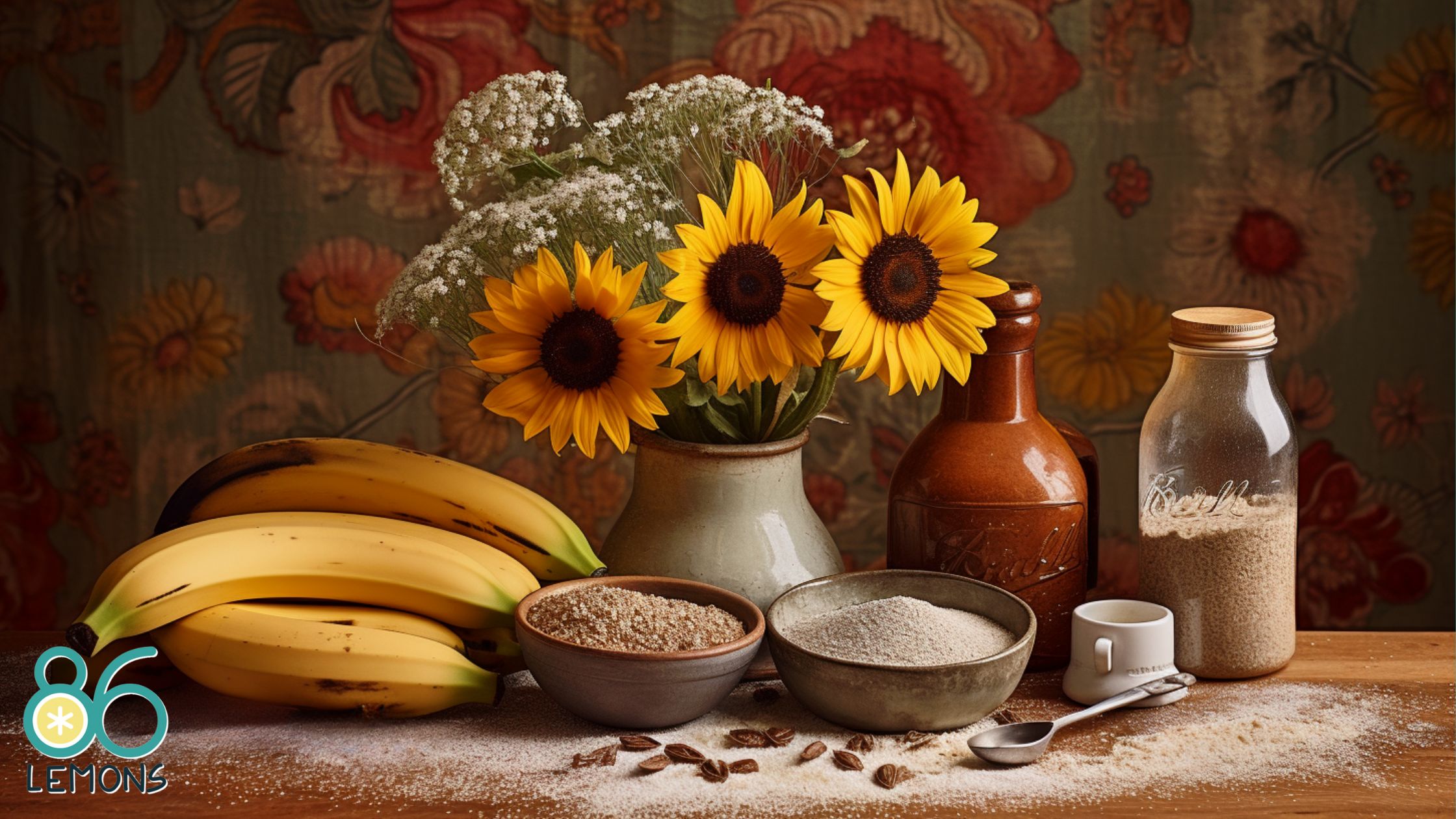Embarking on a vegan journey doesn’t mean you have to give up the joys of baking your favorite treats. The world of vegan baking has expanded enormously, offering an array of vegan egg substitutes for baking that will help you create everything from fluffy muffins to perfect pancakes.
Whether you’re a committed vegan or simply looking to reduce your egg intake, there’s a substitute that can fit nearly every baking need. Understanding how these alternatives work can be the key to success in your plant-based baking adventures.
Navigating the variety of egg substitutes available to vegans can be exciting. Each substitute comes with its own unique benefits and is better suited for certain types of recipes.
For instance, you can use mashed bananas for sweetness and moisture in cakes, while options like ground flaxseed can provide the binding needed in cookies and brownies. With a little experimentation, you can tweak your old favorites into new vegan classics without sacrificing texture or flavor.
Key Takeaways
- Vegan egg substitutes make baking possible for those following a plant-based diet.
- Options like bananas and flaxseed cater to different baking needs, ensuring versatility in recipes.
- Experimentation with various substitutes unlocks new nuances in vegan baking.
The Basics of Vegan Egg Substitutes
Welcome to the exciting world of vegan baking! Your traditional egg roles, such as binding, leavening, adding moisture, and acting as emulsifiers, can all be achieved with vegan substitutes. Read on to discover how you can harness these substitutes to create your delectable baked goods!
Understanding Egg Functions in Baking
Eggs play a vital role in traditional baking, offering moisture, binding ingredients together, leavening to help baked goods rise, and acting as emulsifiers to create a uniform texture. Their versatility is unmatched, but don’t worry, your vegan alternatives are just as capable!
For example, a proper vegan egg yolk substitute not only binds ingredients but also contributes to the richness of your dishes, mimicking the very qualities for which egg yolks are treasured.
Types of Vegan Egg Substitutes
Exploring vegan egg alternatives is like unlocking a treasure chest of baking secrets. Let’s break down the types by their primary function:
- For Moisture: Your go-to options include ripe bananas and unsweetened applesauce, adding not just moisture but a touch of natural sweetness. Use ¼ cup of applesauce to replace one egg and enjoy the tenderness it brings!
- For Binding: If you’re looking for a strong binder, flaxseeds and chia seeds gel up wonderfully. Mix one tablespoon of ground flaxseed with 3 tablespoons of water and let it sit until it achieves a gel-like consistency.
- For Leavening: Baking soda activated with apple cider vinegar creates a chemical reaction that will give your cakes and muffins that desirable fluffiness.
- Emulsifiers: Soy lecithin and aquafaba (the liquid from cooking legumes) are fantastic emulsifiers, aiding in combining fats and waters seamlessly for smooth batters.
By understanding these vegan substitutes and how they work, you’ll be able to create vegan baked goods that are just as delightful as their traditional counterparts. So, grab your whisk and get ready to bake up a storm with confidence!
Vegan Egg Substitutes for Baking
Embarking on a plant-based baking adventure? You’re in for a treat! Discover the magic of using vegan egg substitutes to transform your favorite recipes into delightful vegan versions. Whether you crave fluffy pancakes or decadent brownies, mastering these intelligent swaps will be your key to success.
Fruit-Based Substitutes
Mashed Banana: Perfect for adding moisture to your baked goods, use 120g (1/2 cup) of mashed ripe banana to replace one egg, as this will not only bind your ingredients together but also infuse a subtle sweetness. Ideal for cakes and muffins, it’s a simple yet effective choice. Learn how to seamlessly integrate bananas into your baking from Vegan Food & Living.
Applesauce: Using 1/4 cup of unsweetened applesauce can substitute for one egg, offering a mild flavor that works wonderfully in most recipes, especially for those who prefer less banana taste. This swap is also superb for introducing natural sweetness and contains fewer calories.
Seed and Nut-Based Substitutes
Flaxseeds and Chia Seeds: To make a “flax egg” or a “chia egg,” mix 1 tablespoon of ground flaxseeds or chia seeds with 3 tablespoons of water and let it sit for 5 minutes until it thickens. Use it in cookies and pancakes for a dose of omega-3 fatty acids. Epicurious has additional tips on wielding these powerful seeds in your baking.
Nut Butter: Peanut, cashew, or almond butter can act as binders while also adding richness to your treats. Generally, 3 tablespoons of nut butter can replace one egg. Be mindful of potential allergies when serving these scrumptious creations.
Legume-Based Substitutes
Aquafaba: The liquid from a can of chickpeas, known as aquafaba, is an incredible egg white substitute. Whip 3 tablespoons per egg for meringues, macarons, and even mayonnaise without the cholesterol.
Chickpea Flour: Combine chickpea flour with water to create a thick batter akin to an egg in consistency. It’s especially good for savory dishes like quiches and frittatas.
Dairy-Free and Commercial Substitutes
Vegan Yogurt: Creamy and thick, dairy-free yogurt can blend seamlessly into baking mixes. Use 1/4 cup to replace one egg, which is particularly effective in cakes and muffins to infuse moisture.
Store-Bought Egg Replacers: There is a wide range of vegan egg products on the market. “JUST Egg” is a notable substitute made from mung beans, designed to cook and taste like eggs. Follow the instructions on the packaging for quantity.
Black Salt (Kala Namak): While not a binding agent, this ingredient can impart an eggy flavor to your dishes, particularly in tofu scrambles and other savory recipes. Use sparingly due to its strong sulfuric taste.
Embrace the versatility and health benefits of these fantastic vegan egg substitutes to turn your baking projects into plant-based masterpieces!
Vegan Baking Tips and Tricks
Exploring the art of vegan baking can transform your kitchen into a creative laboratory where you achieve the same delightful textures and flavors as traditional baking. With a few clever substitutes and methods, you’ll be whipping up everything from airy meringues to moist brownies with ease.
Making Fluffy Meringues and Cakes
Achieving that perfect fluffiness in vegan meringues and cakes is all about incorporating air and stability. Here’s how:
- Leavening Agents: Utilize a combination of baking soda and white vinegar or lemon juice to introduce air bubbles into your batter, creating lightness in cakes.
- Whipping it up: For meringues, a chia egg or aquafaba—the liquid from canned chickpeas—can be whipped to stiff peaks, resembling the texture of egg whites.
Creating Moist Cookies and Brownies
To ensure your cookies and brownies are irresistibly moist, follow these tips:
- Bananas & Applesauce: For chewy cookies, mashed bananas serve as a great binder and provide moisture.
- Silken Tofu: Incorporate silken tofu to give brownies a dense, fudgy texture, using 1/4 cup pureed tofu to replace one egg, as detailed on The Kitchn.
Preparing Rich, Savory Dishes
Savory vegan dishes can still be rich and satisfying with the right substitutes. Here’s a quick guide:
- Tofu for eggs: In recipes like quiches and omelets, firm tofu, combined with turmeric for color, can mimic the texture and appearance of eggs.
- Vegan egg replacements: For dishes that require the binding quality of eggs, such as french toast or muffins, JustEgg or a flax egg—1 tablespoon of ground flaxseed mixed with 3 tablespoons of water—provides the perfect solution.
By keeping these tips and tricks up your sleeve, your vegan baking will yield results so delectable, they’ll amaze anyone, vegan or otherwise!


